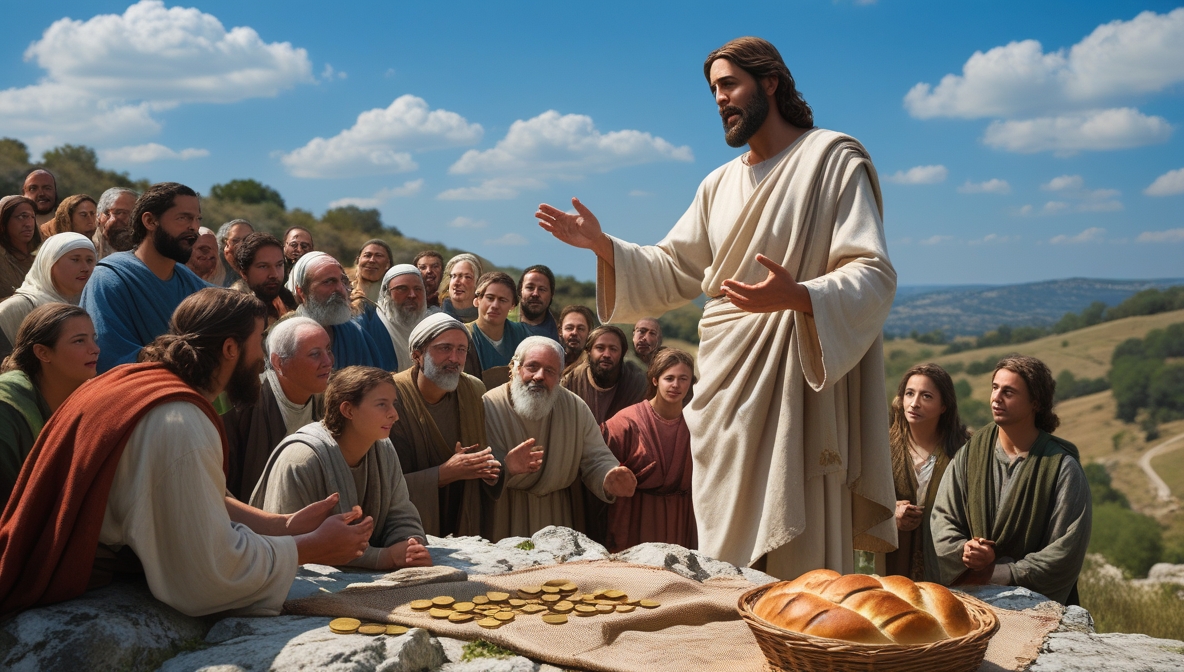Why you should pay attention to Jesus’ teaching on money
You might be surprised how often Jesus talked about money, possessions, and generosity. If you skim the Gospels, you’ll find that issues of wealth and how you use it show up again and again in his stories, instructions, and confrontations. That’s not an accident. Jesus’ teaching on money is central because money reveals what you love, how you trust God, and how you treat other people. This article walks you through the major Gospel-centered teachings, helps you see the patterns, and offers practical ways you can apply what Jesus taught about money and generosity in your life.
The big idea: money reveals the heart
When Jesus speaks about money, he’s often pointing to the condition of the heart. Money itself isn’t evil; it’s a mirror. The choices you make with your resources expose what you ultimately worship, what you fear, and what you value. That insight undergirds most of the Gospel narratives about wealth, from the Sermon on the Mount to the parables. If you want to understand Jesus’ teaching on money, start by asking: what is money showing about you?
Jesus’ teaching on money in the Sermon on the Mount: treasure, worry, and masters
The Sermon on the Mount is perhaps the clearest place to begin. Jesus tells you not to store treasures on earth but to store them in heaven, because where your treasure is, your heart will also be. See Matthew 6:19-21. He follows that with the powerful line that you cannot serve two masters—you will either love the one and hate the other—which comes in the context of money and possessions. See Matthew 6:24.
You also get practical counseling in the same sermon: don’t be anxious about what you will eat or wear; God knows your needs and invites you to seek his kingdom first. See Matthew 6:25-34. Taken together, these passages show that Jesus’ teaching on money is not primarily about accounting rules; it’s about trust, priority, and the orientation of your life.
Give in secret and keep generosity sincere
One recurring theme in Jesus’ teaching on money is how you give. He warns against making a show of your generosity so that people will praise you. Instead, he tells you to give in secret—the Father who sees in secret will reward you. See Matthew 6:1-4.
This teaching reshapes how you think about motives. Generosity becomes less about public recognition and more about worship and obedience. When you give secretly, you test whether you truly trust God or are seeking human approval. The sincerity of your giving matters to Jesus because it reveals the state of your heart.
Generosity as a spiritual practice: “Give, and it will be given to you”
Jesus often links giving to blessing in unexpected ways. He teaches, “Give, and it will be given to you. A good measure… will be poured into your lap.” See Luke 6:38. That promise is less a formula for financial return and more a description of how generosity reshapes your life: you become part of a cycle where needs are met, relationships are strengthened, and God’s grace flows through you.
This teaching encourages you to see generosity as an active spiritual discipline. It forms you into someone whose hands are open and whose priorities are oriented outward, not selfishly inward.
Stewardship and responsibility: the Parable of the Talents
Jesus’ parable about the talents (or minas) is a vivid lesson on stewardship and accountability. In Matthew 25:14-30 he tells about servants entrusted with different amounts of money. The ones who invest and multiply what they are given are commended; the one who buries his talent out of fear is rebuked.
From this story, you learn that resources are entrusted to you for kingdom purposes. Jesus’ teaching on money here emphasizes responsibility: you will be held accountable for how you use what you’ve been given. The parable pushes you to consider not just protecting your wealth but actively using it for good that lasts.

Wealth, detachment, and the rich young ruler
One of the most piercing encounters in the Gospels is when a rich young man asks Jesus what he must do to inherit eternal life. After listing the commandments, the young man claims to have kept all of them and asks what he still lacks. Jesus says, “Sell your possessions and give to the poor, and you will have treasure in heaven. Then come, follow me.” See Matthew 19:16-21.
When the young man goes away sad because he has great wealth, Jesus explains how hard it is for the rich to enter the kingdom and uses the startling image of a camel going through the eye of a needle. See Matthew 19:22-24. This encounter demonstrates how attachments to riches can become barriers to following Jesus. Jesus’ teaching on money here is direct: if your possessions are a stronger claim on your allegiance than God is, they become a spiritual obstacle.
The Rich Fool: storing for yourself, not God
In another parable, Jesus tells of a man who builds bigger barns to store abundant crops so he can “take life easy.” God calls him a fool and says, “This very night your life will be demanded from you.” See Luke 12:16-21.
The parable critiques an inward-focused mindset that hoards resources without generosity or readiness to meet eternity. Jesus’ teaching on money in this passage urges you to live with an awareness of mortality and to invest in what matters beyond temporal comfort.
Using wealth wisely: the shrewd manager (dishonest steward)
The parable of the dishonest manager (often called the shrewd steward) is puzzling but instructive. In Luke 16:1-13, a manager squanders his master’s wealth but shrewdly reduces debts to win friends. Jesus commends the manager’s shrewdness—not his dishonesty—but uses the story to teach how people of the world plan for the future, and urges his followers to use worldly resources shrewdly to make eternal friends.
The point for you is practical: your money can be used to build relationships, serve the poor, and create opportunities for the Gospel. Jesus teaching on money here encourages clever, purposeful use of resources so that your investments have eternal value.
The rich man and Lazarus: compassion and consequence
In Luke 16:19-31, Jesus tells the story of a rich man who routinely ignored a poor beggar named Lazarus. After death, their fortunes reverse. The parable shocks you into seeing the moral consequence of indifferent wealth: ignoring the needy can have eternal implications.
This story underlines how you use wealth matters to God and that compassion is non-negotiable. Jesus’ teaching on money here is stark: wealth that isolates you from others and desensitizes you to suffering is spiritually dangerous.
The widow’s offering: small gifts, great faith
In the temple, Jesus watches the crowds donate and points out a poor widow who gives two small coins—everything she had. He says she has put in more than all the others because she gave out of her poverty. See Mark 12:41-44 and Luke 21:1-4.
The message is clear: generosity is not measured only by amount but by sacrifice and trust. Jesus’ teaching on money here celebrates faith-driven giving and reminds you that God values the posture of your heart more than the headline numbers.
Jesus and the temple: money, exploitation, and prophetic critique
Jesus’ dramatic clearing of the temple courts (see Matthew 21:12-13) is as much about money as it is about worship. He overturns tables and accuses those who turned a place of prayer into a marketplace. Similar accounts appear in Mark 11:15-17 and Luke 19:45-46.
Jesus’ teaching on money here opposes religious systems that exploit people financially and treat worship as a transaction. He envisions faith communities where justice, mercy, and genuine devotion are primary—not financial gain.
Giving without expectation: love that expects nothing in return
Jesus pushes generosity beyond reciprocity. In Luke 6:27-36, he teaches you to love your enemies and to lend without expecting anything back. He also instructs you in Luke 14:12-14 to invite the poor, the crippled, the lame, and the blind to your banquets—people who cannot repay you.
The pattern is striking: generosity is an overflow of grace, not a strategy to improve your reputation or bank balance. Jesus’ teaching on money consistently elevates self-giving and hospitality as central markers of discipleship.
Tithing, justice, and mercy: the priority of heart over ritual
When Jesus confronts the Pharisees about tithing, he rebukes them for neglecting justice, mercy, and faithfulness, even though they carefully tithe small herbs. See Matthew 23:23. His point is not that tithing is wrong; it’s that external religious actions are meaningless if they are not accompanied by compassionate living.
If you want to follow Jesus’ example, focus on the substance of God’s law—loving God and neighbor—rather than merely getting the ritual details right. Jesus’ teaching on money here prioritizes ethics and mercy over legalism.
Wealth can be used for good: examples that complicate a simple “wealth is bad” view
You mustn’t oversimplify Jesus’ teaching on money into a blanket condemnation of wealth. For example, Zacchaeus—once wealthy—responds to grace by pledging to give half his goods to the poor and to repay anyone he defrauded fourfold; Jesus declares salvation has come to his house. See Luke 19:1-10.
This story shows that wealth can be redirected and reinscribed by repentance and generosity. The problem isn’t wealth per se; it’s where wealth points your heart and whether it corrupts your compassion.
Practical principles from Jesus’ teaching on money
There are consistent practical principles you can draw from Jesus’ teaching on money that translate into everyday habits:
- Prioritize kingdom investments over accumulation. Jesus invites you to invest in things that last—people’s lives, justice, and mercy—rather than merely expanding your store of goods. See Matthew 6:19-21.
- Give sacrificially and joyfully. Generosity is an expression of trust and gratitude. The widow’s example shows that sacrificial giving carries spiritual weight. See Mark 12:41-44.
- Use resources shrewdly for gospel ends. Think creatively and strategically about how money can open doors for compassion and proclamation. See Luke 16:1-13.
- Resist worshipping wealth. Money has a way of competing with God for your loyalty. Jesus warns you plainly. See Matthew 6:24.
- Do not neglect justice and mercy. Religious devotion without righteousness is hollow. See Matthew 23:23.
These principles give you a posture to adopt, not merely a checklist to complete.
How to practice Jesus-centered generosity today
Putting Jesus’ teaching on money into practice means forming habits and rhythms that reorient your life. Here are actionable steps you can take to align your finances with Gospel priorities:
- Create a giving plan. Decide ahead of time what percentage of your income you’ll give, who you’ll support, and how you’ll balance immediate needs with long-term kingdom investments.
- Practice hospitality regularly. Make room in your life to welcome people, especially those who can’t repay you. Hospitality turns resources into relationships.
- Be transparent and accountable. Invite trusted friends or mentors to ask about your financial life and generosity. Accountability helps you keep motives honest.
- Build in a margin to be available to respond to needs. Jesus’ parables often put generosity in the context of urgent, human need. If you budget with a margin, you’re more ready to act.
- Teach and model generosity to others. If you influence children, family, or friends, help them see money as a tool for loving God and neighbor.
These practices take time to form, but they translate the big principles of Jesus’ teaching on money into everyday behavior.
Common misunderstandings about Jesus’ teaching on money
There are several frequent mistakes that misinterpret Jesus’ words:
- Thinking Jesus condemned wealth across the board. He warned about wealth’s dangers but also affirmed the possibility of wealthy followers who are generous and repentant—see Zacchaeus.
- Reducing generosity to a formula for blessing. Passages like Luke 6:38 aren’t magic formulas for getting rich; they describe how generosity reshapes life and community.
- Equating piety with financial ruin. Jesus didn’t ask everyone to sell everything; he asked people to put God first. The rich young man was asked to sell because his wealth was what stood between him and following Christ. See Matthew 19:16-24.
- Confusing public giving with private faith. The Pharisees practiced outward piety but missed the weightier matters of justice and mercy. See Matthew 23:23.
Grasping these distinctions helps you apply Jesus’ money teachings wisely and avoid extreme or simplistic readings.
What Jesus’ teaching on money means for churches and communities
Jesus’ words challenge how Christian communities organize resources. If you follow his lead, your church will emphasize meeting needs, protecting the vulnerable, and avoiding exploitation. The early church reflected this in practice—though the record of that is outside the Gospels, the Gospels provide the ethical foundation. For example, Jesus’ critique of money-driven worship (see Matthew 21:12-13) calls congregations to resist systems that prioritize finance over faithfulness.
When your community pursues generosity together—through collective aid, transparent budgeting, and sacrificial giving—you model Jesus’ vision: a people whose resources are channeled toward mercy, welcome, and kingdom impact.
Decision points: questions to test your money posture
To help you evaluate whether your financial life aligns with Jesus’ teaching on money, ask yourself:
- Where does my first time, energy, and money go? Do those commitments reflect kingdom priorities?
- Do I give in ways that require real sacrifice and demonstrate trust?
- Am I guarding my heart against the subtle idolatry of wealth and success?
- Is my use of resources building relationships and serving the poor?
- Do I practice hospitality and generosity without keeping score?
These questions are practical tests that help you move from abstract principles to concrete changes.
A pastoral encouragement: it’s about progress, not perfection
Following Jesus’ teaching on money is a lifelong journey. You won’t get everything right overnight, and grace covers your stumbles. What matters is direction and honesty. If you find yourself clinging to resources in fear, admit it, pray, and take small, tangible steps toward generosity. The Gospel rewires priorities gradually: you learn trust by acting on small trusts. Jesus knows your struggles and calls you to a way of life shaped by love, not anxiety.
Final reflections: what ties all these teachings together
Across parables, sermons, and confrontations, a few themes tie Jesus’ teaching on money together: the centrality of the heart, the call to generosity, the danger of idolatry, and the use of resources for neighbor and kingdom. Money is a test and a tool. Jesus wants you to use it as a means to love God and others, not as an ultimate security or status marker.
When you live this out, generosity stops being a duty and becomes the natural fruit of a life centered on Christ. You begin to see money less as an idol and more as a way to participate in God’s work in the world.
Suggested next steps for you
If you want to move forward with what you’ve read:
- Pick one passage above, read it on Bible Gateway, and ask God to show you one change to make.
- Create a simple giving plan for the next three months and commit to it.
- Practice one act of unexpected generosity this week—invite someone in, pay for someone’s meal, or give to a cause you usually ignore.
- Find an accountability partner to check in monthly about generosity and financial priorities.
These small steps help you embody Jesus’ teaching on money in practical ways.
Conclusion
Jesus’ teaching on money is unmistakable in its urgency and grace: money reveals your heart, and generosity reorients you toward God and neighbor. The Gospels consistently call you away from worry, hoarding, and self-preservation toward trust, sacrificial giving, and compassionate use of resources. If you let these teachings shape you, your money will become less about security and more about service—and that shift changes not only your bank account but your life and the lives of people around you.
Explore More
For further reading and encouragement, check out these posts:
👉 7 Bible Verses About Faith in Hard Times
👉 Job’s Faith: What We Can Learn From His Trials
👉 How To Trust God When Everything Falls Apart
👉 Why God Allows Suffering – A Biblical Perspective
👉 Faith Over Fear: How To Stand Strong In Uncertain Seasons
👉 How To Encourage Someone Struggling With Their Faith
👉 5 Prayers for Strength When You’re Feeling Weak

📘 Jesus and the Woman Caught in Adultery – Grace and Mercy Over Judgement
A powerful retelling of John 8:1-11. This book brings to life the depth of forgiveness, mercy, and God’s unwavering love.
👉 Check it now on Amazon 🛒💥
🔥 “Every great message deserves a home online.” 🌍💬🏡
Don’t let your calling stay hidden. Start a Christian blog or website using Hostinger — with 99.9% uptime, a free domain, and SSL, your voice can shine for God’s glory anytime, anywhere.
💥 Begin today. 🛒 Try it RISK-FREE! ✅
✝️ “Your body is God’s temple — care for it with purpose.” 💪💖🏛️
Renew your energy and restore balance naturally. Mitolyn helps support a healthy metabolism, giving you the vitality to live out God’s calling with strength and confidence.
🔥 Unlock Your Metabolic Power! ⚡Burn More Calories & Feel Great With Mitolyn. 💪
👉 Start Today. 🚀 Check Price Now. 🛒💰
💰 As a ClickBank & Amazon Affiliate, I earn from qualifying purchases.
📖 Acknowledgment: All Bible verses referenced in this article were accessed via Bible Gateway (or Bible Hub).
🚀 Want to explore more? 👉 Dive into our new post on Why Jesus? and experience the 🔥 life-changing truth of the Gospel!








